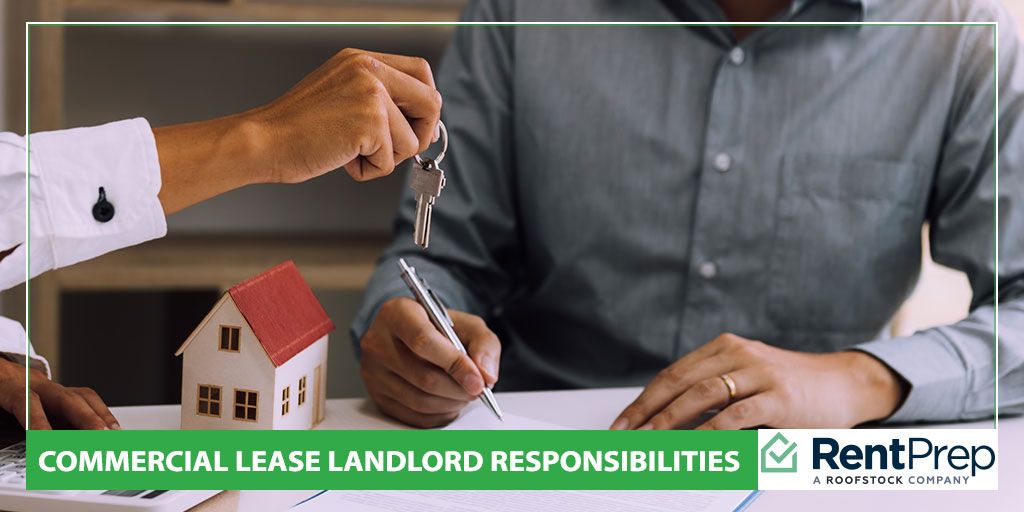
When someone says ”landlord,” most people think of residential landlords. Indeed, most landlords work with residential investments before considering commercial properties due to the difference in cost. But do you know what commercial lease landlord responsibilities are involved when changing to commercial work?
Many rental property investors are unfamiliar with commercial landlord responsibilities or leases as they haven’t dealt with them before. This can lead to bad deals, costly bills, and miscommunication with tenants and lessees. Avoiding these issues is necessary for stabilizing your bottom line.
We’ve put together a guide to help you learn more about commercial landlord obligations and how commercial leases work. Follow along to begin your commercial investment journey on a solid foundation.
A Table Of Contents On Commercial Lease Landlord Responsibilities
Landlords have responsibilities in both commercial and residential leases, but those obligations can vary dramatically. Clear up what is part of commercial landlord obligations with today’s guide:
- What Is A Commercial Lease?
- Commercial Lease Landlord Responsibilities Explained
- Commercial Lease Tips For Landlords
- FAQs On Commercial Landlord Responsibilities
- Keep Commercial Lease Landlord Obligations On Track
What Is A Commercial Lease?
 Commercial leases are contracts used when businesses rent office or business space from landlords. ‘Commercial’ describes the lease because the property is intended and appropriate for business rather than residential uses.
Commercial leases are contracts used when businesses rent office or business space from landlords. ‘Commercial’ describes the lease because the property is intended and appropriate for business rather than residential uses.
Commercial properties and tenants come in various forms. Commercial properties may contain office or retail spaces or be warehouses used in manufacturing. Tenants include small business owners, S-corps, or even substantial multinational companies.
The types of properties and tenants you will work with depend on your location, investment style, and property type. Learning how to work in your specific niche of the commercial industry will help you find success in commercial investing.
How Commercial And Residential Leases Differ
You might wonder if the terms included in commercial and residential leases are vastly different. There are many terms and ideas utilized in both lease types, but there are several major differences between the two.
The biggest difference for many landlords is the amount of regulation of the leases by government ordinances and laws. Residential leases are highly regulated. States, cities, and even townships have rules that must be abided by when writing leases. These rules dictate many aspects of rental contracts, including eviction terms, responsibilities, and more.
Commercial leases do not face the same amount of regulation. Most states only hold commercial leases to the same level of scrutiny as any other type of contract. This means that the only law that guides how commercial leases are formed is contract law.
This can be scary for landlords who are new to commercial properties because a lot needs to be specifically outlined and agreed upon in a lease since existing laws predetermine nothing. This also makes a commercial lease very customizable. The flexibility is both a boon and a bane. In time, experience with this lease type makes it more approachable for all parties.
Types Of Commercial Leases
Commercial leases typically fall into one of two categories. There are subtypes within these categories, but it’s essential to first understand the broader terms of the lease types.
The first type is known as a gross or full-service lease. In this lease, the rental payment from the tenant covers all expenses at the premises. Modified versions of this lease, such as a triple net lease, negotiate the expenses included in the rental payment.
The second type is known as a net lease. Tenants pay the net amount of expenses at the property. These expenses are reimbursed to the landlord or paid directly by the tenant. An absolute net lease passes all costs, maintenance, repairs, and expenses to the tenant.
Even though these are some of the most common standards utilized in the commercial rental industry, every contract is negotiable and may vary from these standards.
Commercial Lease Landlord Responsibilities Explained
What is a landlord typically responsible for in a commercial lease agreement?
The main responsibilities fall into the following categories:
- Repair of structural and major components of the property
- Replacement work on capital expenditures (i.e., roof, parking lot, foundation)
- External building repairs, particularly at properties leased by multiple commercial tenants
The tenant typically remains responsible for the following:
- Ordinary repairs to items inside the property
- Maintenance of the interior of the property
For many other responsibilities, the contract will decide which party is responsible for their replacement, maintenance, and repair including:
- HVAC systems
- Landscaping
- Water and electrical systems
The fewer tenants there are in a single commercial property, the more likely that tenants will take over key responsibilities. In commercial buildings where you are renting out to a large number of commercial tenants, it’s more likely that you will retain duties such as system maintenance, cleaning, and external building management.
Compliance And Safety Issues
In nearly all commercial leases, the landlord ensures that the facility and property are fully up-to-date for compliance and safety issues. At a bare minimum, the property must meet these codes when it’s turned over to the tenant:
- Full compliance with state and local codes
- Fire, gas, and electrical safety
- Asbestos abatement and management
- Meeting necessary energy efficiency levels
- All structural repairs
Of course, there are leases where these responsibilities are handed off to the tenant. As mentioned, there are no specific rules about who must carry these responsibilities. That is why it is essential to ensure that your commercial leases clearly detail who will take care of these areas.
Insurance
Another issue that needs to be clarified as far as who carries the responsibility is insurance. In most cases, both parties will need to have some type of insurance to protect their property.
Commercial property owners typically carry commercial property insurance. Tenants can get commercial renter or commercial property insurance depending on the type of commercial lease in place.
Commercial Lease Tips For Landlords
 The biggest thing to remember when working with commercial leases is that you need to be detailed in covering which party will manage specific responsibilities. You must clearly define who will be responsible for building maintenance for internal walls, for example, to avoid conflict with your tenant.
The biggest thing to remember when working with commercial leases is that you need to be detailed in covering which party will manage specific responsibilities. You must clearly define who will be responsible for building maintenance for internal walls, for example, to avoid conflict with your tenant.
Of course, that’s not the only problem you may encounter. Follow these tips to ensure you utilize the best commercial lease possible.
Check State-By-State Provisions
Some states have provisions that affect contracts. As with residential leases, it’s crucial that you research your state and city to ensure you are in full compliance when preparing a lease. Since commercial leases often involve higher dollar amounts than residential leases, consult an attorney to ensure your lease is legal before signing with a tenant.
Be Prepared For Diverse Contracts
Commercial leases vary significantly from property to property, tenant to tenant. Read up on leases, including examples from industries like yours. Get a good handle on what is typically included in a lease and what might come up.
Choose Tenants Carefully
Just as you need to screen residential tenants thoroughly, you should also create a process for screening commercial tenants. Often, these tenants will be business tenants, so your screening process will be slightly different. Usually, this will mean screening the people from the business (often an LLC) deemed liable for the lease terms in the same way the company is.
Regardless of who you will be screening, we here at RentPrep have the business solutions you need. Check out our high-volume screening options today to ensure you can meet your commercial property screening needs.
FAQs On Commercial Landlord Responsibilities
What else is there to know about commercial lease terms? Spoiler: there’s a lot! Keep learning today with the answers to the most frequently asked questions on the topic:
What must a landlord provide at a commercial property?
The bulk of your tasks as a landlord of a commercial property will be determined by the rental contract in place. There are no specific rules about what services must be provided, though the responsibility for some tasks are commonly given to landlords in these agreements.
In most cases, the agreements will hold landlords responsible for keeping the structure and exterior in good condition, ensuring the roof and parking lot are usable, and servicing significant systems like electrical and HVAC.
When commercial land is being leased to a single tenant, some of these responsibilities may be passed to the tenant. Regardless of who is responsible, the details must be clearly outlined within the commercial lease agreement.
Who is responsible for repairs in a commercial lease?
The tenant and the landlord are responsible for repairs in a commercial lease, though the particulars will always be decided in the contract they sign.
Generally, tenants are only responsible for what breaks or needs to be replaced due to their regular usage. For example, flooring and paint inside the building will be their responsibility to repair and keep in good condition. Broken bathroom fixtures, damaged walls, and other internal repairs are usually the tenant’s duty to handle.
On the other hand, the landlord is responsible for the more significant structural issues. This includes structural foundation issues, roofing, the parking lot, HVAC systems, electrical systems, and similar items. Many contracts also require the landlord to ensure the property meets all local building, safety, and fire codes.
How do I evict a commercial tenant in my state?
Evicting commercial tenants is a speedy process in comparison to residential tenants. Since there are not many regulations dictating what commercial property eviction needs to look like, the contracts for commercial spaces allow for immediate eviction when rent goes unpaid.
In Pennsylvania, for example, contracts often include confession of judgment laws, which allow the landlord’s attorney to act on behalf of the tenant and “confess” to defaulting without a hearing. This quickens the eviction process.
Commercial properties that are not residential may even have their locks changed if rent is not paid. While illegal in the residential sector, this can happen in commercial real estate.
Your lease agreement will determine how eviction must proceed, so research your options and include your preferred eviction proceedings in the contract.
Can a landlord sell a commercial property during a lease?
Yes, properties can be sold even if there is a tenant as long as no lease terms prevent this from happening. The lease agreement is typically considered valid with the new landlord.
If you plan on selling a property occupied by tenants, it may be best to offer them reduced rent during the showing period. This will help offset any inconvenience incurred by the sale process.
What is the most important consideration in a commercial lease?
One thing that you should really focus on as you develop a commercial lease is the rent structure. Rent structures vary widely between commercial contracts, and the type of payment structure used can greatly impact your bottom line.
Some rent structures include certain expenses in the rent; others require you to pay the expenses and be reimbursed. Sometimes, the landlord may cover these all together and then have each tenant pay a portion.
You also want to be sure you have clear terms about the preferred dispute resolution process. This will prevent you from needing to go to court over disputes or evictions. Instead, you can require that both parties first work with a professional arbitrator. Many commercial leases include this type of request.
Keep Commercial Lease Landlord Obligations On Track
It’s essential to understand how commercial leases work and what landlords are responsible for within those leases. Without this knowledge, you can accidentally write yourself into a deal that decimates your bottom line and leaves you struggling to move forward with your investment plans.
Remember these essential responsibilities for landlords within commercial leases:
- State guidelines for commercial leases can and do vary. Be sure to research and adhere to your local guidelines.
- Commercial landlords rely on the contract to cover everything in more specific detail than residential landlords due to the limited nature of governing laws in the commercial space. Be thorough.
- Be sure to cover all standard obligations in the lease, including but not limited to heating, cooling, repairs, upgrades, compliance, payment plans, eviction actions, and more.
It’s not fair to say that either commercial or residential landlords have more responsibilities. The main point is that the obligations of landlords in both situations differ greatly. If you aren’t familiar with the types of responsibilities you have, it’s easy to make mistakes. Keep up-to-date on how commercial leases evolve to remain at the top of your game.

